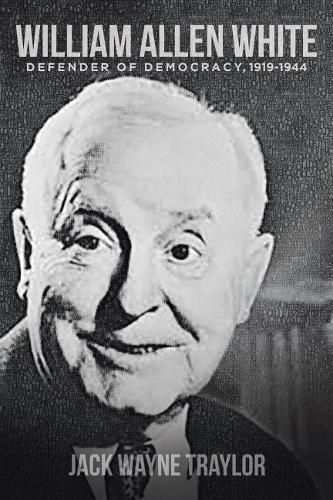Readings Newsletter
Become a Readings Member to make your shopping experience even easier.
Sign in or sign up for free!
You’re not far away from qualifying for FREE standard shipping within Australia
You’ve qualified for FREE standard shipping within Australia
The cart is loading…






This title is printed to order. This book may have been self-published. If so, we cannot guarantee the quality of the content. In the main most books will have gone through the editing process however some may not. We therefore suggest that you be aware of this before ordering this book. If in doubt check either the author or publisher’s details as we are unable to accept any returns unless they are faulty. Please contact us if you have any questions.
Once upon a time, William Allen White of Emporia, Kansas, was a household name in America. An acquaintance of every twentieth century president from Theodore Roosevelt to Franklin Roosevelt, he held a close friendship with the former and generally was an admirer of the latter. White allied himself with the Progressive movement early in the twentieth century, originally from the influence of T. R., but also from others such as Woodrow Wilson. The author of numerous books, both fiction and non-fiction, and an important political advisor within the Republican party, although he traveled and spoke often both in the United States and sometimes abroad, White nevertheless was most proud of the fact that he was a small-town newspaper editor in Emporia until his death there in 1944. He was an important supporter of middle class and middle western values, but a close examination of his writings from the end of World War I until 1944 shows that he was most concerned about support for democracy, which he defined as Christianity institutionalized. This came at a time when democratic principles were coming under scrutiny or outright attack, both at home and abroad. Politically he always sought to promote the moderate course, attempting to bring both major parties together in a common ground. Even though he is not widely known today, perhaps his message has a significant value to twenty-first-century America.
$9.00 standard shipping within Australia
FREE standard shipping within Australia for orders over $100.00
Express & International shipping calculated at checkout
This title is printed to order. This book may have been self-published. If so, we cannot guarantee the quality of the content. In the main most books will have gone through the editing process however some may not. We therefore suggest that you be aware of this before ordering this book. If in doubt check either the author or publisher’s details as we are unable to accept any returns unless they are faulty. Please contact us if you have any questions.
Once upon a time, William Allen White of Emporia, Kansas, was a household name in America. An acquaintance of every twentieth century president from Theodore Roosevelt to Franklin Roosevelt, he held a close friendship with the former and generally was an admirer of the latter. White allied himself with the Progressive movement early in the twentieth century, originally from the influence of T. R., but also from others such as Woodrow Wilson. The author of numerous books, both fiction and non-fiction, and an important political advisor within the Republican party, although he traveled and spoke often both in the United States and sometimes abroad, White nevertheless was most proud of the fact that he was a small-town newspaper editor in Emporia until his death there in 1944. He was an important supporter of middle class and middle western values, but a close examination of his writings from the end of World War I until 1944 shows that he was most concerned about support for democracy, which he defined as Christianity institutionalized. This came at a time when democratic principles were coming under scrutiny or outright attack, both at home and abroad. Politically he always sought to promote the moderate course, attempting to bring both major parties together in a common ground. Even though he is not widely known today, perhaps his message has a significant value to twenty-first-century America.